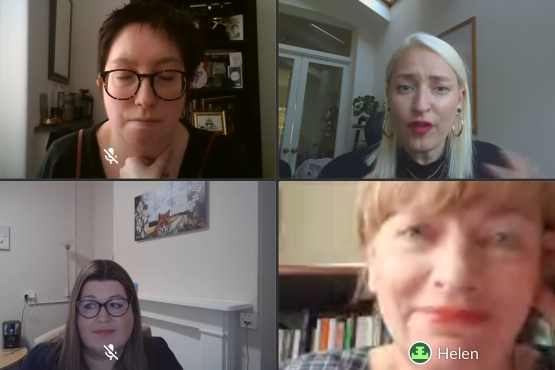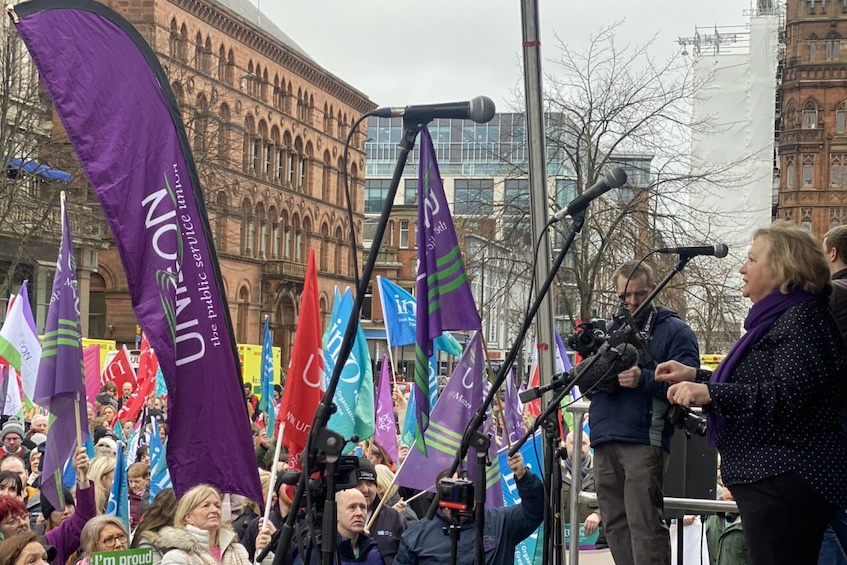MiP Summit: We must never believe the NHS is immune to sex discrimination

Women make up over 70% of the NHS’s workforce but still face significant disadvantages compared to men, MiP’s head of operations, Helen Carr, told members at MiP’s virtual Summit on 4 November.
This year’s Summit takes the form of 90-minute virtual meetings spread over the week. Wednesday’s session featured a panel discussion on gender equality in the workplace.
Women often have to juggle work with childcare and other caring responsibilities, may face harassment and discrimination in the workplace and don’t have the same chances of promotion as men, Carr explained. “These are key issues for MiP. We in the trade union movement must ensure the NHS is taking gender inequality seriously.”
She described how MiP has set up a women’s network to influence policy and drive change, and ensure women had a louder voice and more visibility within the union.
Discrimination has consequences
Sam Allen, chair of the Health and Care Women Leaders Network and chief executive of Sussex Partnership Foundation Trust, said the NHS was in many ways no different to the rest of society: “We must never believe that we are immune to the discrimination, the bullying and harassment, or [the effects of] the structural design of our beloved institution, which leads to poor experiences and outcomes.” She explained how discrimination is linked to productivity and sickness absence – and ultimately has an impact on patients.
One concern for all panellists was ‘intersectionality’ – where women also have other characteristics that can multiply the disadvantages they face in the workplace. The panel discussed how BAME and LGBTQ+ women can see the impact on their careers amplified – as can those who are disabled. Many employers won’t have data broken down to cover these groups – but what the data does show is bleak, Allen said.
The median pay gap between men and women across the NHS was still around 13% – but with huge variation, she explained. There are still many areas where women are under-represented, such as in finance, estates and at the higher levels of medicine. And women are still under-represented on trust boards, she said, with 150 more women needed to achieve parity with men. She also noted that that there are still 70 all-white boards, with the North East and South West having the least diverse NHS leadership.
Impact of COVID
The panel went on to discuss how older woman have less access to training and development and are more likely to leave the workforce.
Covid has thrown some of these issues into stark relief, with women often having to do the lion’s share of childcare, said Sian Elliott, the TUC’s policy officer on women’s rights at work. Working from home exposed some women to a greater risk of domestic violence, she explained, while Brexit could see some women’s rights rolled back. Evidence that women were more likely to be furloughed and lose their jobs than men meant “women are having to carry the costs of this crisis,” she said.
Elliot explained that accurate data was vital to tracking what is happening in workplaces. She pointed out that the requirement for many firms to collect data on their gender pay gap had been shelved this year, while firms employing under 250 people were exempt from collecting it anyway. Unions such as MiP had a key role to play in holding employers to account for their gender pay gap and pushing them to take action to address it, she said.
“Boards need to take this seriously. The only real way to fix it is to get more women into senior positions,” Allen added.
Elliot also urged the UK government to adopt “a Scandinavian approach” to parental leave. In the UK, paternity leave had to be taken at the expense of the mother’s maternity leave, whereas Scandinavian countries took a “use it or lose it” approach which encouraged both parents to take leave.
Culture change
Elliot stressed the importance of cultural change in encouraging women to speak up about issues like sexual harassment. “We need to create a workplace culture where people feel safe to discuss this and where there are repercussions for the perpetrator,” she said. Many employers only addressed sexual harassment through their bullying and harassment policies and ignored risk factors such as power imbalances and lone working, she explained. Carr said trade unions need to ensure proper procedures were followed sexual harassment cases and that they were not dragged out.
The panel agreed that the Care Quality Commission’s ‘well-led’ assessments could be a powerful tool to push organisations towards reducing gender inequality. “I would like to see a focus on concerted action and doing things that will really shift this and make the change,” said Allen.
Summing up the discussion, MiP’s Helen Carr said: “We have the evidence and we have the action plans – we just need to make sure that the outcomes are implemented, monitored and evaluated.”
|
MiP has welcomed moves to speed up pay progression for Band 8 and 9 managers and tackle long-standing problems with the Agenda for Change pay system that deter staff from seeking promotion.
23 September 2024
| By MiP
News
|
|||||
|
MiP has welcomed a 5% pay rise for very senior and executive senior managers in the NHS in England, after the UK government accepted the latest recommendations from the Senior Salaries Review Body (SSRB).
09 September 2024
| By MiP
News
|
|||||
|
MiP has welcomed the 5.5% pay rise for NHS staff on Agenda for Change as “a notable shift” and a “good starting point” for future negotiations.
04 September 2024
| By MiP
News
|
|||||
|
The health secretary’s plans to cut 5,500 management jobs to fund community services if the Conservatives win the general election have been criticised as “not credible” by Labour and “paper thin” by MiP.
25 June 2024
| By MiP
News
|
|||||
|
After months of industrial action, NHS workers in Northern Ireland have accepted a 5% pay offer for last year negotiated by health unions and the Department of Health.
05 April 2024
| By MiP
News
|
|||||
|
NHS leaders must show how they are driving service improvement, delivering transformation, promoting equality and developing a just culture as part of new “competency framework” for directors introduced by NHS England this month.
04 April 2024
| By MiP
News
|
|||||
|
Three-quarters of MiP members say NHS England’s new hybrid working policy is more likely to damage productivity than improve it, according to a recent survey. Half say there isn’t enough office space for staff to return to the office.
03 April 2024
| By MiP
News
|
|||||
|
The latest NHS Staff Survey showed a modest improvement in staff morale, but found NHS workers were facing record levels of discrimination, and a significant proportion still plan to leave their jobs in the near future.
20 March 2024
| By MiP
News
|
|||||
|
Related News
-

MiP responds to the abolition of NHS England
Government risk repeating same mistakes as Lansley by abolishing NHS England and cutting more staff from ICBs, says MiP.
-

NHS England and central staff could be cut by 50%, NHSE has announced
Government planned cuts at NHS England go much further than previously announced, with up to 50% of staff at risk.
-

New MiP survey shows growing support for principle of regulating managers, but warns it won’t improve patient safety
MiP’s member survey on regulating NHS managers shows managers are still not convinced regulation will improve patient safety or raise standards, despite growing support for it in principle.







